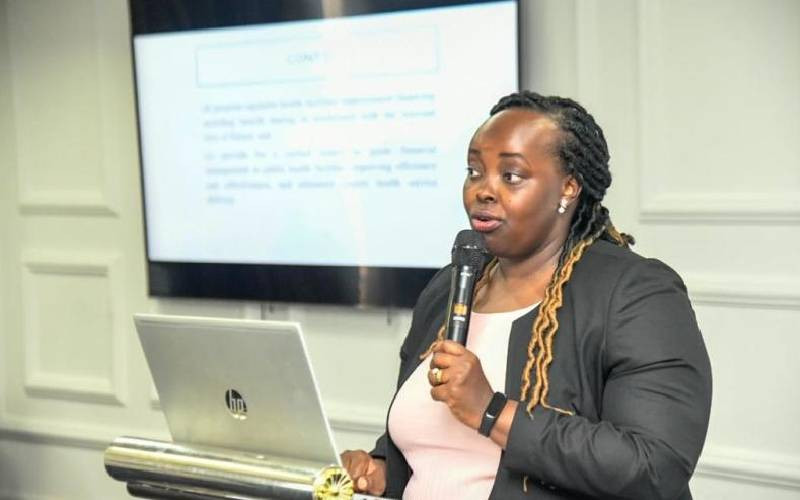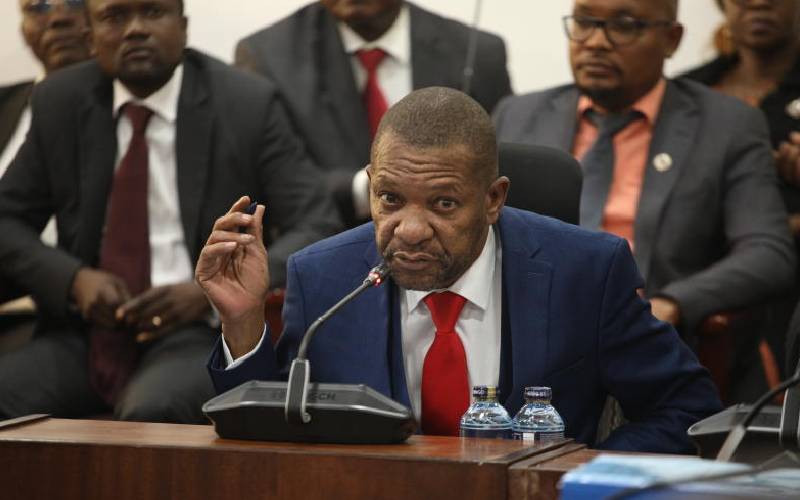
The National Assembly and the Senate have less than two weeks to pass the proposed National Health Insurance Fund (NHIF) bills before the official launch of Universal Health Coverage (UHC) by President William Ruto on Mashujaa Day.
Once the President assents the bills into law, NHIF will go under a huge reorganisation exercise that will see the fund scrapped and in its place, the Social Health Authority will take over in a transition that will take 12 months.
President Ruto is expected to officially launch the programme during Mashujaa Day celebrations to be held in Kericho.
Whereas the bills have been criticised and welcomed by Kenyans and experts the National Assembly Health Committee chairperson Robert Pukose said the bills are meant to kick-start UHC and boost healthcare.
Pukose said it is during the regulations stage that Kenyans will be expected to give their opinion about their contributions.
"We have not reached this stage (mode of contribution), and Kenyans should therefore hold their horses," said the Endebess MP.
The four Bills include the Primary Health Care Bill, Facility Improvement Financing Bill, Digital Health Bill and the Social Health Insurance Bill.
- Ministry, governors clash over ghost workers in health payroll
- Ghost worker claims fuel uncertainty in prolonged UHC standoff
- Health insurance reforms echo NHIF failures, add new burdens
- Kenya emerges as East Africa's Digital Health hub in push for UHC
Keep Reading
The Primary Health Care Bill will provide a framework for the effective delivery and management of primary healthcare services using Primary Healthcare Networks (PCNs) and Community Health Units while clearly delineating the roles of all stakeholders in the provision of primary healthcare services across the Republic of Kenya.
The Primary Health Care Bill also seeks to entrench the role of Community Health Promoters in the provision of community-based Primary Healthcare Services.
According to the proposal, Facility Improvement Financing Bill will provide for an efficient, secure and accountable mechanism for the collection, retention and management of revenue derived from health services rendered at public health facilities in Kenya to support the respective public health facilities optimal operations for effective service delivery throughout the financial year, whereas the Digital Health Bill will develop, operationalise and maintain the Comprehensive Integrated Management Information System, to manage the core digital systems and the infrastructure required for its seamless health information exchange.
Under the Digital Health Bill, the Government will establish the Digital Health Agency to manage the system, with counties establishing county health data banks, whereas the National Government will have national health data banks. The bill will also help the provision of service remotely, through telemedicine.
"The tariffs will be operationalised through regulations which will also be subjected to public participation on how much they will contribute to the funds and who to benefit," said Pukose.
Mid this year, President Ruto proposed a 2.75 per cent contribution to the scheme.
"Once the Bill is passed by the National Assembly and the Senate, the Ministry, in consultation with the Board of the Social Health Authority will develop Regulations to have Kenyans contribute at a modality of 2.75 per cent capped at a minimum of Sh300 and a maximum of Sh5,000," said Terry Rotich, a Senior State Counsel at the Ministry of Health.
"We are not being taxed four times with the proposed Bills. Kenyans shall only contribute to the Social Health Insurance Fund, after we formulate regulations, at an agreed amount," Rotich said.
Health CS Susan Nakhumicha has maintained that the proposed bills will guarantee provision of quality healthcare to all Kenyans, unlike the current system that focuses on curative services where patients seek services at high-end hospitals, ignoring those at the lower level.
The ministry, she said, is developing primary health networks to have a clear referral system.
"The queues we see at KNH are people who are there but have gone there for cough and flu. We want to ensure health centres are working, and you're linked to them. By the time you're linked to KNH, you must have been referred there," said the CS.
According to Pukose, it is too early to talk about tariffs and benefits.
The birth of UHC has walked for more than 18 years but flopped even after piloting in Isiolo, Nyeri, Machakos and Kisumu due to lack of structures and laws to govern its operations.
The National Assembly introduced the Social Health Insurance Bill, and the Digital Health Bill, whereas the Senate introduced the Primary Healthcare Bill and the Facilities Improvement Financing Bill (FIF)
On Wednesday last week, the National Assembly passed the Social Health Insurance Bill, and the Digital Health Bill, whereas the Senate during its siting in Lodwar passed the FIF bill and Primary Healthcare Bill.
The bills passed by the National Assembly will be handed to the Senate, whereas those at the Senate will be handed to the National Assembly for concurrence, a process expected to be complete before the Mashujaa Day Celebrations.
The Social Health Insurance Bill basically establishes three funds namely Social Health Insurance Fund, the Emergency Chronic Diseases and Critical Care Fund, and the Primary Healthcare Fund.
Pukose said the Primary Healthcare fund will be able to take care of illnesses at Levels 1, 2 and 3.
Meanwhile, the social health insurance bill will take care of illnesses from Levels 4, 5 and 6.
Critical emergency and chronic care illnesses will take care of diseases at all levels.
"Each of the bills once passed by both houses will be enacted into four different acts namely Social Health Insurance Act, FIF Act, Primary Healthcare Act and Digital Health Act, which will guide in the delivery of UHC," explained Pukose.
The MP added, "NIF will be scrapped within a year".
Ms Rotich maintained that the Kenya Kwanza Government has identified healthcare delivery as one of the four pillars of the Bottom-Up Economic Transformation Agenda (BETA).
Also, the government plans to integrate Information Communication Technology systems to enhance telemedicine, and health management and information system.
The proposed Bills include the Primary Health Care Bill which will provide a framework for the effective delivery and management of primary healthcare services using Primary Healthcare Networks (PCNs) and Community Health Units while clearly delineating the roles of all stakeholders in the provision of primary health care services across the Republic of Kenya.
The Bill also seeks to entrench the role of the Community Health Promoters in the provision of community-based Primary Healthcare Services.
Currently, NHIF does not pay for Level 2 and 3 services, apart from Linda Mama services.
Ms Rotich noted that the Primary Healthcare Bill seeks to establish Primary Healthcare Networks that shall comprise of a hub (Level 4 Primary Healthcare Referral Facility) and spokes (Community Health Units, Level 2 & 3 Health Facilities).
"Patients have been walking to Level 4 to 6 hospitals because NHIF doesn't cater for services at Levels 2 and 3. This is why we need the Social Health Insurance Bill and the Primary Healthcare Bill in order to have proper referral structures," said the legal advisor.
Whereas NHIF currently handles complaints, with the enactment of the Social Health Insurance Bill, the Government plans to set up a Dispute Resolution Tribunal for the purpose of hearing and determining complaints, disputes and appeals with aggrieved persons or Healthcare Providers.
 The Standard Group Plc is a multi-media organization with investments in media
platforms spanning newspaper print
operations, television, radio broadcasting, digital and online services. The
Standard Group is recognized as a
leading multi-media house in Kenya with a key influence in matters of national
and international interest.
The Standard Group Plc is a multi-media organization with investments in media
platforms spanning newspaper print
operations, television, radio broadcasting, digital and online services. The
Standard Group is recognized as a
leading multi-media house in Kenya with a key influence in matters of national
and international interest.











